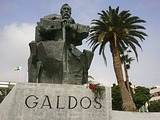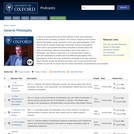
Lesson plan and activities on Benito Pérez Galdós's novel Torquemada en la hoguera.
- Subject:
- Literature
- Material Type:
- Teaching/Learning Strategy
- Author:
- Juan Herrero-Senes
- Susanna Pamies
- Date Added:
- 02/11/2021

Lesson plan and activities on Benito Pérez Galdós's novel Torquemada en la hoguera.

A series of lectures delivered by Peter Millican to first-year philosophy students at the University of Oxford. The lectures comprise of the 8-week General Philosophy course, delivered to first year undergraduates. These lectures aim to provide a thorough introduction to many philosophical topics and to get students and others interested in thinking about key areas of philosophy. Taking a chronological view of the history of philosophy, each lecture is split into 3 or 4 sections which outline a particular philosophical problem and how different philosophers have attempted to resolve the issue. Individuals interested in the 'big' questions about life such as how we perceive the world, who we are in the world and whether we are free to act will find this series informative, comprehensive and accessible.

This course considers how the visual and material world of “nature” has been reshaped by industrial practices, ideologies, and institutions, particularly in nineteenth- and twentieth-century America. Topics include land-use patterns; the changing shape of cities and farms; the redesign of water systems; the construction of roads, dams, bridges, irrigation systems; the creation of national parks; ideas about wilderness; and the role of nature in an industrial world. From small farms to suburbia, Walden Pond to Yosemite, we will ask how technological and natural forces have interacted, and whether there is a place for nature in a technological world.
Acknowledgement
This class is based on one originally designed and taught by Prof. Deborah Fitzgerald. Her Fall 2004 version can be viewed by following the link under Archived Courses on the right side of this page.

It happens in almost every classroom community: Someone has something someone else wants. Someone has the hottest new video game, sneakers or action figure; someone else feels jealous and expresses these feelings in unproductive ways. Issues of class and materialism underlie these interactions, and children often lack ways to talk productively and openly about what is really going on.
The lessons that follow will start a conversation about material consumption. We will explore why we want the things we want, how it feels not to have everything we want, and how to appreciate non-material possessions that can make us rich in deeper ways. In the upper elementary grades, children will also be encouraged to think critically about media messages and will have an opportunity to engage in a social action project aimed at minimizing materialism and entitlement.